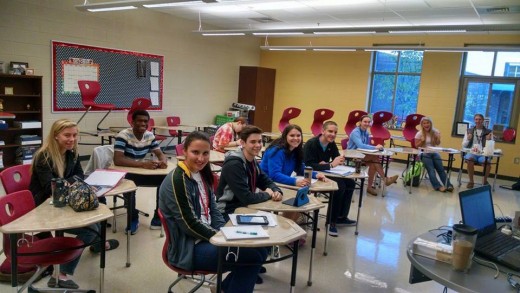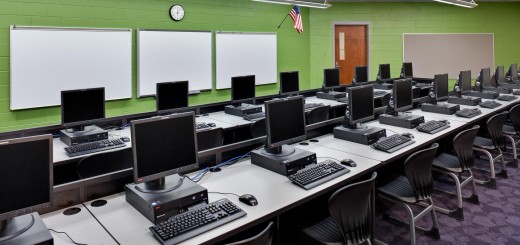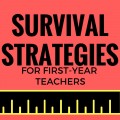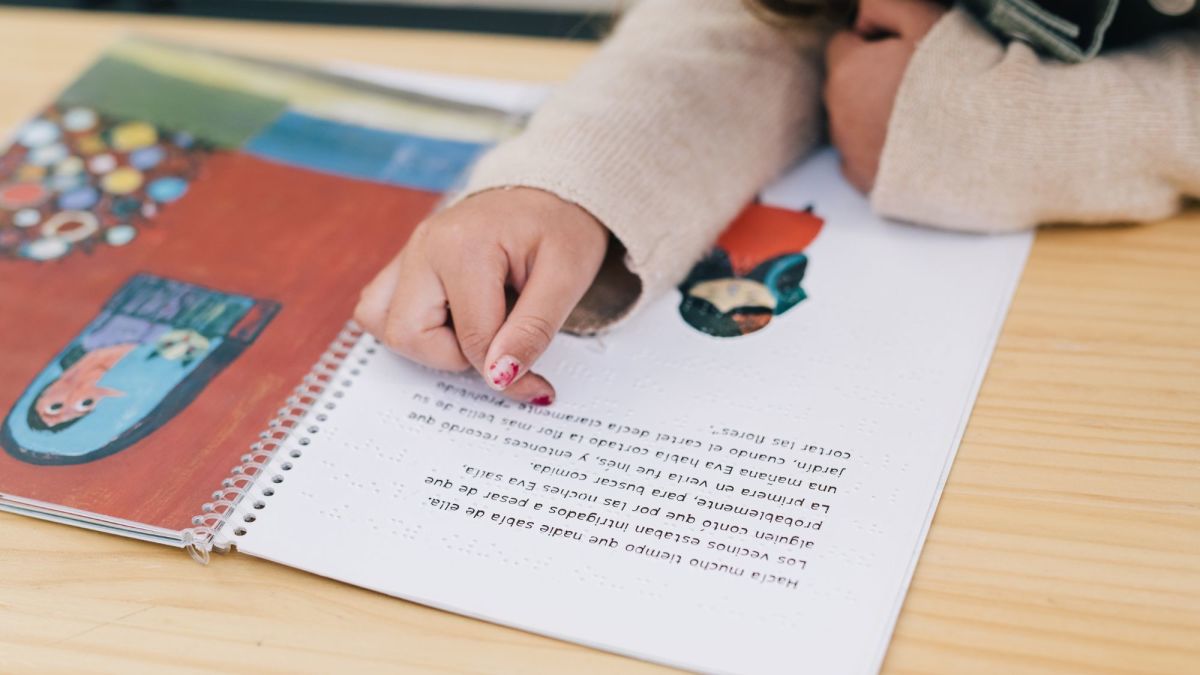How to be a good Teacher to students who don't learn the same
Students Learning their Study Skills

Introduction
There is an art to teaching. Not only do we need to be champions of Christ in our actions, we must have mastered our knowledge in addition to pedagogy (Slavin, 2012). As teachers we are never finished learning. We are teachers who need to have a deep and complete knowledge of what is taught in conjunction with an ability to take this knowledge and have it come across as authentic while honing in the skill of communicating the knowledge in an effective way (Brummelen, 2009). The material taught must not only be understood but we must really know the information, but beyond this we must teach our students in a way that is beyond of knowledge. We must stimulate deeper learning. God created us as a natural inquisitive being. Teaching a student to memorize facts and reiterate them on a test is not truly teaching the students. Rather a teacher needs to provide real world situations in which the student can apply these facts and think about the information. As students grow they are able to problem solve better because of what they have learned they can apply. Some students grow at a greater speed. This is why a gifted student has to have a learning theory that is specialized to that group of students.
Learning Theory and It's Importance
Students should be taught in an accelerated environment with all three of their modalities taken into account during most if not all lessons, thus making grouping essential to a gifted student’s success (Reis & Renzulli, 2005). . These classes should incorporate lectures, presentations, group activities, demonstrations, frequent tests and quizzes, timed writing, essays, and discussions (Lee, & Olszewski, 2006) In a study of 152 teachers only 16% agreed with the fact that acceleration is ineffective. This was blamed on social issues such as friends. This needs to be at the top of a learning theory because even 75% of the teachers agreed that they at one time knew a student who should have been accelerated, but never was. This could hinder a child for the rest of their life (Siegle, Wilson, and Little, 2013). There is a correlation between self-esteem and subject-acceleration which is not always easy to understand. The students can experience stressful situations and have different emotions that would be felt during their acceleration programs. But this is a small population of the students, and many will not remember what occurs, which still holds that acceleration should be a key in the learning theory for gifted students (King, 2012).
In addition to being taught in an accelerated environment, Christian values must be integrated into the gifted students learning, indirectly if in a secular school. This has worked for American Islamic schools. (Al-Lawati, & Hunsaker, 2007) Gifted students exist in Christian schools and secular schools. Ultimately whether teaching in a Christian school or a secular school, the most important principle to uphold is that the learning performed by the students is a meaningful education. As a teacher I find my goal to have my students leave my class feeling as if they are not only prepared for a test, but rather a life lesson. Preparing a student for the world is not a straight forward task, there are different learners: verbal, intrapersonal, naturalist, visual, logical, etc (Van Brummelen, 2009). Each student will take from different tasks differently, but if Christian values are implemented into the school environment, not just in the curriculum the students will learn material, as well as have more life lessons such as morality, integrity, love, compassion and so many more morals implemented into the person the student becomes.
Carolina Springs Middle School

Description of an Effective Teacher
Direct Instruction
As a component of Slavin’s (2006) QAIT model for an effective classroom direct or explicit instruction is needed. The first direct instruction would be the syllabus. There are state learning objectives and orient students to lesson which ultimately lets students what they will be learning and why, which is essential for a gifted student who may have the modality of a visual learner. Other steps include: review prerequisites, present new material, and conduct learning probes, provide independent practice, assess performance and provide feedback, and provide distributed practice and review, much like van Brummelen’s four phases of learning.
Motivation
Motivation guides and maintains behavior over time. Motivation can be enhanced. This can be done by teacher’s emphasizing learning goals and positive attributions. These students already have higher motivation. This is perfect for gifted students. Teachers expect a lot from gifted students and if teacher’s put high expectations and clear expectations on their students, their motivation and achievement can be improved even greater. Teachers can also give clear, immediate, frequent feedback to their students to continue a motivation to learn. (Slavin, 2006)
Classroom Management
The learning environment is where students become independent, contributing, caring, and creative learner. In the field of education, good classroom management is an integral part to an effective classroom (Froyen & Iverson, 1999). Through encouraging the student’s self control in a process by promoting positive student achievement and behavior the classroom can function efficiently. Each student needs a full understanding of what is expected of him/her and consequences that may follow. It is important the student feels comfortable in their environment, themselves, others, and their teacher. This is why there will be meaningful discussions of the rules and teacher and student relationships throughout the week. The rules are stated in this manner, because teachers and students develop the rules together each year, pending on where the rules fall within the guidelines of the district. Through going through these rules, the student will have some ownership about how the class in run and any consequences to rules they may incur (Slavin, 2012).
Technology
My school district has been blessed to have grants that have supplied iPads to every middle school and high school in the district. These iPads have had many different advantages to students. The school is able to put blockers on the iPads so no inappropriate material is reaching the student, while the student does not have to carry so many books, class time is increased due to not having extended times to have to go to lockers, and school safety has increased due to only being allowed sling bags, because heavy book bags are no longer needed. The instructional technology at the school is responsible for overseeing and facilitating educational technology in schools with an end result of fostering student achievement through the new implementation of technology while collaborating in student- centered classrooms. This new technology has been able to provide six broad groups of improvement in technology: These six basic strands comprise the new national technology standards for students: Creativity and Innovation, Communication and Collaboration, Research and Information Fluency, Critical Thinking, Problem-Solving & Decision-Making, Digital Citizenship and Technology Operations and Concepts. Not matter how positive technology can be, it is important to keep it in a biblical view. 1 Corinthians 6:12 states, "“All things are lawful for me,” but not all things are helpful. “All things are lawful for me,” but I will not be enslaved by anything." It is important that teachers do not rely on the technology rather use it as an effective tool, without making students slaves to it.
Learning Characteristics
Acceleration programs are a fast track for gifted students to learn. Grouping is key to their learning, but in order to go about their learning they do have four phases they can go through to address their multimodalities in their grouping setting.
Four Phases of Learning
Students do not always learn the same way. They have multimodalities including visual, auditory, and kinesthetic. Van Brummelen (2009) proposed four phases of learning. In the example provided these four phases can be seen as well as how multimodalities can be applied. Phase one can be known for the visual learner, who needs to see what they will be learning on paper. Phase two can be for the auditory learner who learns information through lecture, while in this stage the auditory learner can also have a teacher to implements the Socratic method, which would give the learner some ability to tap into other modalities in order to learn the material properly. Then phase three can be for the kinesthic learner, because they will actually have to do something in order for reformulation to occur; however, like with many gifted classes, this could mean just another test, but in certain fields this can be a phase for the kinesthic learner. It would be important to gauge how to supply kinesthetic learning to history, languages, and other two-dimensional studies. In phase four, all modalities are able to shine, because what each modality or multimodality took from the lesson they are able to hone their skills in. This can be seen in gifted classes often when they take unit tests to prepare for the final exam, or in many cases the Advanced Placement test for their subject.
As mentioned above, there are four phases to learning. The first phase is phase one, setting the stage. The second phase is disclosure which would take place in the classroom setting (Van Brummelen, 2009.) The stage is set by instructing students about what will be taught, this can be done through good lesson planning and a well-versed syllabus. The student will be able to know the information they are going to receive, and know what they will or should know by the end of the class. The third phase is reformulation. During this phase, the classroom is considered in an undesirable state. Unfortunately, this will occur in a classroom because the most undesirable state is when a gifted student has to take a final exam, or advanced placement test. The final phase is phase four, transcendence. This is where the student has taken what they have learned from their reformulation state and applied it that they are more, well-informed (Van Brummelen, 2009).
These four phases could have the potential to work, especially if a classroom was set up that the phases could occur (Van Brummelen, 2009). In this case, an AP Chemistry class could implement all four stages in the same setting. Most science classrooms in my school have an instructional setting and in the open part in the back of the classroom is a lab setting. This would provide setting the stage and disclosure in the same space. The teacher is able to teach the safety precautions as well and go over the instructions for going into the lab for experiments. The reformulation can occur in the lab setting that is right within the classroom setting by the students applying what they learn in a controlled environment. Then last but not least transcendence can occur. If a student makes the wrong mixture in chemistry, the teacher is able to isolate the chemicals used which would cause such a reaction, or if an incision on an animal was made wrong, the teacher can guide the student in the right way. Though many places, these phases may not work, in the school setting, a science classroom would be the perfect area to make something work. Deuteronomy 32:2 says it best, "Let my teaching fall like rain and my words descend like dew, like showers on new grass, like abundant rain on tender plants." Once all four stages are able to be taught, students will grasp onto what they are doing right and incorrectly, and the actions and words of the teacher will mean that much more, and the student will feel accomplished because they were able to do it on their own, and with only one teacher providing insight the student does not seem to take it too much to heart, rather they know the teacher cares and only wants the best for them in the setting. Having all four phases in one setting, though not ideal, could prove to be the best move for students.
The students in 21st century public middle schools are increasingly diverse in terms of language proficiency, cultural and ethnic representation, and varied levels of poverty, and yet, they are being educated in a political climate that encourages mainstreaming special education and gifted services in the regular classroom. Given this context, this study sought to examine 48 middle school content-area teachers' beliefs about teaching in diverse classrooms to determine how these beliefs affected their willingness and capacity to differentiate their instruction and assessment. Four teacher beliefs emerged from interview, observation, and document data that conflict with the philosophy undergirding differentiation (Brighton, 2003). There are commonly held myths about grouping students by ability, differentiating ability grouping from tracking, and question the allegation that gifted programs are elitist. Rather than presenting new data, the existing studies are interpreted to provide support for their assertions that ability grouping can be an appropriate method to provide instruction to gifted students and that other venues within a school utilize grouping without being labeled as elitist. Some argue that gifted students do not benefit from grouping; providing heterogeneously grouped experiences is most effective for all students; and assuring that there are some gifted students in all classrooms will provide positive role models for others and will automatically improve the classroom climate (Fiedler, Lange, and Winebrenner, 2002). I do not agree with this. In personal experience students have shown to become bored in classes where they have to go at a slower rate in order for the entire class to understand the specific lesson.
Personal Reflection
Study Skills Inventory
Throughout this class we have had the opportunity to take two sets of skills inventories. The first inventory was taken at the beginning of the class, and to see the dramatic difference in a few weeks shows how the impact a teacher with the right materials could have on a student’s study skills within that time frame. Gifted students do tend to have a problem with time management because they are taking multiple, difficult classes at one time. My time management showed an increase in scoring. I directly relate this to the massive amount of school work in combination of a full time job that has slowly taught me that life is no longer handled by my parents. I am an adult and if anything will be accomplished then I must confront the problem and incorporate it into my life.
One of my most drastic changes was note-taking. I was particularly surprised as to how much my note taking has improved. I was always under the impression my note taking was exceptional, but with an improvement in note taking, I have see a higher group of quiz and test grades, which shows a correlation between notes and tests. With my gifted and advanced placement students I would want to write a lesson in at the beginning of the semester to show how I expect notes to be taken. I find it easier with outlines in order to take notes, and I would implement this to help my students advance their note-taking skills as well.
The study skill of reading is very important, but it can vary in importance in certain classes. As gifted students, the students will be expected to read a lot of pages for many classes. This is where time management comes into play, but some classes such as mathematics, reading is not as important as practicing the arithmetic. In previous classes reading has been a large factor in success in classes. In my own case, I have noticed that reading, though very important, is not the end of a class. These classes have been teaching me that there are new ways to learn, that do not included reading 100 pages, and reciting in the information, therefore I have not had to reread the material and make as many notes in my books. Also, the assistance of e-books has greatly helped, because one can search for key words without having to reread something.
I originally stated, "For a pre-test I find my scores within a range I would have guessed. I do not believe I have bad test-taking skills or study skills; however, as one progresses as a student they always learn their skills can improve. Merely changing time management can have a way of making a lot of these scores increasing." This is almost true. Once my time management increased in scores, so did my memory, learning behavior, stress, written communications, and test taking. It is strange how one skill can trigger so many other skills. Some skills I do not believe should have been as low as they are especially technology and reading. I believe I read a lot and understand the material in front of me, and if I do not understand it I make sure to look up the words to understand it. And technology I stay up to date on constantly. However, everything has flaws and these may be the questions asked flaws or flaws of my own I did not even realize.
These surveys taken through the class on study skills, learning styles and learning profiles have prompted me to believe that surveys are essential for teachers to know where they stand for their students. A common class known at the Classroom Practices used a survey through the National Research Center on the Gifted and Talented in order to come up with the notion that the gifted and talented students receive differentiated educations in regular classrooms in classrooms across the country. The survey samples included a general sample of 3,993 third and fourth grade teachers working in public school settings. A survey instrument called the Classroom Practices Questionnaire (CPQ) was developed to obtain background information on the teachers, their classroom, and their school districts as well as their perceptions of their teaching behavior related to gifted and average students in their classes. The major finding of this study is that 3rd and 4th grade teachers make only minor modifications in the regular classroom to meet the needs of gifted students. Through these surveys some classroom teachers also attempt to eliminate material that students have mastered, provide the opportunity for more advanced level work, give students some input into how classroom time is allocated, and expose gifted students to higher level thinking skills, however, these modifications are not used widely (Archambault Jr., Westberg, Brown, Hallmark,Emmons, & Zhang, 1993).
Learning Styles Profile
This helped me understand what differentiated instruction is, why it is appropriate for all learners, how to begin to plan for it, and how to become comfortable enough with student differences to make school comfortable for each learner in the classroom (Tomlinson, 2001). In my learning styles results my results were very evenly split. For my leadership and management skills, the pie was broken up into increments of 10.4% to 11.9%. Mentoring ia a skill that was evenly broken up in the pie graph in which is needed in order to have the acceleration program work, and managing is certainly needed to have grouping work properly. Under the Action Model my pie graph was almost broken up into perfect 25% increments. As for gifted students they need to have the opportunity to be taught, observed, listened, and action taken on their behalf. This is a delicate bunch that futures could be ruined because they were not nutured properly. This is another reason why the acceleration and grouping of gifted students is a necessity.
Philosophical Methodology of Learning Profile
According to my test, I rank in the positive realms of traditionalist, behaviorist, progressivist, and socialist, and in the negative realm of humanist. My score for progressivist was the highest at 1.17, while my lowest positive was socialist at 0.33. My negative score for humanist was -0.60. At most I am considered a progressivist. I express myself, knowledge for the sake of knowledge is useless, learn only by experience and the group is what counts. This is why I want there to be grouping for the accelerated students. Their knowledge is for their future, and in these classes they will be able to apply it through experience and as many hands on kinesthic things possible. In the accelerated program critical thinking projects are key. I am far from a humanist. I do not believe in the open classroom or classroom without walls. There must be structure, especially for the gifted students, and this can be done through the classroom management and four phases of learning.
Conclusion
The review on literature stated that overall acceleration is a good thing for students and helps them advance to their maximum capacity. The problems that lead to this misconception include a lack of knowledge and awareness about when and how to accelerate students (Wood, Portman, Cingrad, & Colangelo, 2010) Grouping practices are essential to the advancement of gifted students. There are three reasons behind this: (1) ability grouping for enrichment; (2) mixed ability cooperative grouping for regular instruction; and (3) grouping for acceleration. It concluded that the research showed strong, consistent support for the academic effects of most forms of ability grouping for enrichment and acceleration (Rogers, 1991).
References
Al-Lawati, F. A. K., & Hunsaker, S. L. (2007). Differentiation for the gifted in American Islamic schools. Journal for the Education of the Gifted, 30(4), 500-518..
Archambault Jr., F. X., Westberg, K. L., Brown, S. W., Hallmark, B. W., Emmons, C. L., & Zhang, W. (1993). Regular classroom practices with gifted students: Results of a national survey of classroom teachers. Storrs, CT: The University of Connecticut.
Brummelen, H. W. (1988). Walking with God in the classroom. Burlington, Ont.: Welch Pub. Co.
Brighton, C. M. (2003). The effects of middle school teachers' beliefs on classroom practices. Journal for the Education of the Gifted, 27(2/3), 177-206.
Fiedler, E. D., Lange, R. E., & Winebrenner, S. (2002). In search of reality: Unraveling the myths about tracking, ability grouping, and the gifted. Roeper Review, 24(3), 108-111.
Froyen, L. A., & Iverson, A. M. (1999). Schoolwide and classroom management: The reflective educator-leader (3rd ed.). Upper Saddle River, NJ: Prentice-Hall.
King, D.C. (2012). Long-term Social and Emotional Outcomes of Subject-area Acceleration on
Gifted Learners. (Doctoral Dissertation). Retrieved from ProQuest Dissertations and
Theses.
Lee, S.-Y., & Olszewski (2006). A study of instructional methods used in fast-paced classes. Gifted Child Quarterly, 50(3), 216-237.-Kubilius.
Reis, S. M., & Renzulli, J. S. (2005). Curriculum compacting: An easy start to differentiating for high-potential students. Waco, TX: Prufrock Press.
Rogers, K. B. (1991). The relationship of grouping practices to the education of the gifted and talented learner (Executive Summary).Storrs, CT: National Research Center on the Gifted and Talented.
Siegle, D., Wilson, H.E., & Little, C.A. (2013). A sample of gifted and talented educators’
Attitudes about academic segregation. Journal of Advanced Academics, 24(1), 27-51.
Slavin, R. E. (1987). Grouping for instruction in the elementary school. Educational Psychologist, 22(2), 109-127.
Tomlinson, C. A. (2001). How to differentiate instruction in mixed-ability classrooms. Alexandria, VA: Association for Supervision and Curriculum Development.
Wood, S., Portman, T.A.A., Cingrad, D.L., & Colangelo, N. (2010). School counselors’
perceptions and experience with acceleration as a program option for gifted and talented
students. Gifted Child Quarterly, volume54(168), 169-17.








